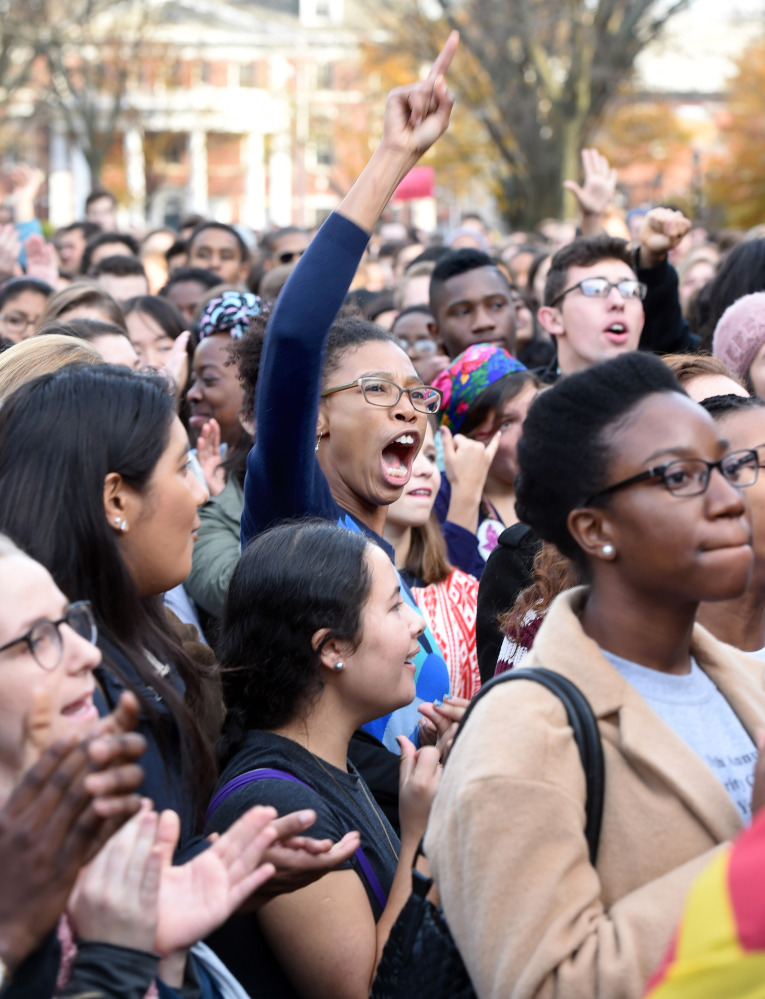SAN FRANCISCO — A recent groundswell of protests on college campuses over race, sexual misconduct and other social issues has some civil libertarians worried that the prized principle of free speech could be sacrificed in the rush to address legitimate student grievances.
The potential conflict between the protection of civil rights and the constitution’s First Amendment guarantees was on display at the University of Missouri in Columbia last week when students, supported by the football team, forced the resignation of system president Tim Wolfe over racial incidents and other problems on campus that they felt he had failed to take seriously. While their campaign drew widespread support and inspired similar demonstrations at colleges across the country, it also prompted a backlash from critics who said some actions went too far.
A Missouri assistant professor supportive of the student protests blocked a student photographer from an area where demonstrators had set up a tent city, a move that infringed freedom of the press. The student protesters quickly reversed the media ban, saying the incident had been a “teachable moment” for them.
Also, university police encouraged students to report any “hateful and/or hurtful” speech they experienced for investigation, leaving the impression that any comment considered offensive could be a crime. Free speech advocates complained and police clarified that offensive language alone would not be treated as a hate crime.
While the First Amendment guarantees freedom of assembly and the right of citizens to state their grievances, it also enshrines freedom of the press and free speech. Some academics and First Amendment experts said the incidents at Missouri showed a hypersensitivity that confused the difference between vigorous public debate and threats or harassment that constitute crimes.
“People wrongly believe they have a right not to be offended. That is not only faulty, but we as educators have a duty to be offensive in the sense of forcing people to rethink their fundamental assumptions,” said New York Law School Professor Nadine Strossen, the former president of the American Civil Liberties Union. “Diversity is cited as this mantra, yet we are killing ideological diversity, which is just as important.”
There have been numerous protests – and even cancellation – of campus speakers who voiced controversial views ranging from liberal comedian Bill Maher to conservative former Secretary of State Condoleezza Rice. Supporters of civil liberties also cited more restrictive campus codes of conduct, and the use of “trigger warnings” to alert students about uncomfortable course content.
Samantha Harris, director of policy research at the Foundation for Individual Rights in Education, said censorship used to come primarily from the top down but now is coming from students.
“Students increasingly seem to be arriving on campus believing that there is a generalized right not to be offended beyond the actual right to be free from harassment and threats, this amorphous right to emotional safety. It’s a troubling trend,” she said.
Send questions/comments to the editors.



Success. Please wait for the page to reload. If the page does not reload within 5 seconds, please refresh the page.
Enter your email and password to access comments.
Hi, to comment on stories you must . This profile is in addition to your subscription and website login.
Already have a commenting profile? .
Invalid username/password.
Please check your email to confirm and complete your registration.
Only subscribers are eligible to post comments. Please subscribe or login first for digital access. Here’s why.
Use the form below to reset your password. When you've submitted your account email, we will send an email with a reset code.